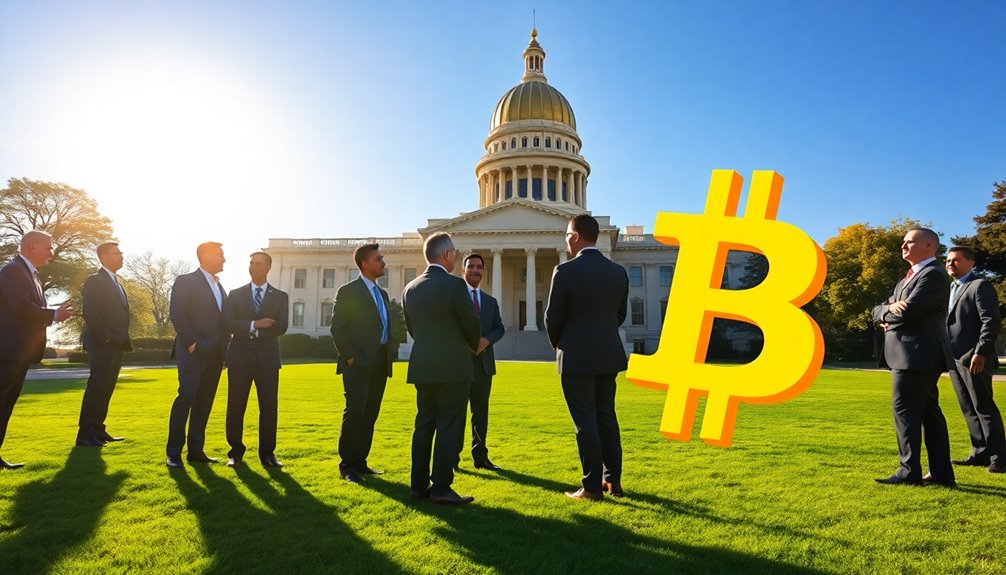Oklahoma's proposed Bitcoin Reserve Act is a game-changer for state finances. By allowing up to 10% of certain funds to be invested in Bitcoin, this legislation aims to protect purchasing power against inflation and safeguard funds from government manipulation. It shows Oklahoma's commitment to fiscal innovation and positions the state as a national leader in adopting digital assets. Sponsored by Representative Cody Maynard, the act reflects a growing trend among states exploring cryptocurrency's potential. If you're curious about the broader implications of this move, you'll find more insights just ahead.
Key Takeaways
- The Bitcoin Reserve Act, introduced on January 15, 2025, aims to integrate digital assets into Oklahoma's state finances responsibly.
- Sponsored by Representative Cody Maynard, the Act seeks to protect state purchasing power from inflation and government manipulation.
- The legislation allows for up to 10% investment in Bitcoin, positioning Oklahoma as a leader in fiscal innovation.
- It reflects a growing trend among states to adopt cryptocurrency as a means of enhancing financial stability.
- The Act includes robust custody requirements to ensure sound management of digital assets within state accounts.
Oklahoma's Financial Innovation Initiative

As Oklahoma seeks to bolster its financial future, the Financial Innovation Initiative aims to diversify state funds by incorporating Bitcoin and other digital assets. By integrating these investments into state savings accounts and pension funds, you'll help protect purchasing power against inflation. This initiative leverages Bitcoin's decentralized nature, looking to generate stable returns through careful management. Additionally, Bitcoin serves as a hedge against inflation, further enhancing the state's financial strategy. As a result, you'll contribute to strengthening the financial stability of state accounts. Oklahoma's proactive approach positions the state as a leader in innovative fiscal policies, preparing for the growing significance of digital assets globally. The bill is set to be debated in the upcoming legislative session, with plans for potential enactment later this year.
Bitcoin Reserve Act Introduced

On January 15, 2025, Oklahoma took a significant step toward financial innovation by introducing the Bitcoin Reserve Act, designed to integrate Bitcoin and other digital assets into state funds. Sponsored by Representative Cody Maynard, this bill allows state funds to invest in digital assets, focusing on responsible management and risk mitigation. It aims to protect purchasing power from inflation, leveraging Bitcoin's decentralized nature to safeguard against government manipulation. The act positions Oklahoma as a national leader in fiscal innovation, potentially serving as a blueprint for other states. Additionally, this initiative reflects a growing trend towards cryptocurrency adoption among states, highlighting its potential impact on the financial landscape.
Bitcoin Price Volatility Analysis

Understanding Bitcoin's price volatility is crucial if you're navigating the cryptocurrency market. The fixed supply of 21 million coins means that demand fluctuations can lead to significant price swings. Events like the halving mechanism, which reduces mining rewards every four years, further influence supply and demand dynamics. Additionally, market sentiment can play a pivotal role in driving price changes, as investors react to news and trends in the crypto space.
Currently, about 19.6 million bitcoins are in circulation, with the cap not expected until 2140.
Moreover, low volatility environments often precede substantial price increases, and recent trends show another instance of this in early 2024. Historical data indicates that Bitcoin's volatility has declined significantly over time, suggesting a potential for more stable price movements in the future.
Yet, regulatory uncertainty and economic shifts can provoke sharp price changes, making Bitcoin particularly sensitive to market perceptions and investor sentiment.
Thus, staying informed about these factors is essential for successful trading.
Corporate Cryptocurrency Investments

With the rapid evolution of the cryptocurrency landscape, corporate investments in digital assets have become a strategic move for many businesses seeking growth. You can choose to buy digital currencies directly, like Bitcoin and Ether, or diversify by investing in various altcoins. However, keep in mind the market's volatility and the importance of understanding blockchain technology. Moreover, understanding that cryptocurrencies are classified as financial assets for tax purposes is crucial for corporate investors to navigate regulatory implications effectively. Additionally, investing in a Bitcoin IRA can provide tax-efficient growth for retirement savings.
Alternatively, consider investing in companies involved in decentralized finance or those developing new blockchain protocols. You might also explore hedge funds specializing in cryptocurrency, which manage diversified portfolios to mitigate risks. Lastly, passive income opportunities like staking can help grow your holdings over time, but be aware of the inherent risks involved.
Legislative Support for Cryptocurrency

Oklahoma's House Bill 1203, introduced by Rep. Cody Maynard, aims to position the state as a leader in innovative fiscal policy. Set for consideration in the upcoming legislative session, the Strategic Bitcoin Reserve Act allows state savings accounts and pension funds to invest up to 10% in Bitcoin and approved digital assets. This initiative aligns with President Trump's vision for financial stability and reflects a broader trend, as Oklahoma becomes the sixth state to explore the potential of digital assets.
With robust custody requirements and a focus on secure investments, this legislation demonstrates a commitment to sound money principles and strategic financial planning.
Long-Term Financial Stability Potential

While many traditional investment options are subject to market fluctuations and inflation risks, Oklahoma's Strategic Bitcoin Reserve Act offers a promising pathway to long-term financial stability.
By investing in Bitcoin, you can diversify state savings and pension funds, reducing reliance on conventional assets. Bitcoin's capped supply of 21 million provides a stable store of value, while its decentralized nature minimizes risks tied to government manipulation. This approach not only protects purchasing power against inflation but also positions Oklahoma as a leader in innovative fiscal policies. Embracing digital assets ensures sustainable growth and enhances financial security for residents, effectively future-proofing state finances in an ever-evolving economic landscape. Furthermore, the historical volatility of crypto-assets highlights the importance of cautious investment strategies in this new frontier.
Frequently Asked Questions
How Can Residents Participate in the Bitcoin Reserve Act?
You can participate in the Bitcoin Reserve Act by staying informed about its implications.
Attend local workshops or educational programs to understand Bitcoin and digital assets better.
Share your thoughts and concerns through public forums or feedback mechanisms set up by the state.
Engaging with your community can help influence how these investments are managed.
Your voice matters, so don't hesitate to contribute to discussions about the state's financial strategies involving Bitcoin.
What Risks Does the Bitcoin Reserve Act Aim to Mitigate?
The Bitcoin Reserve Act aims to mitigate several risks.
It addresses inflation by leveraging Bitcoin's limited supply, making it a reliable store of value.
It also seeks to enhance financial stability during economic uncertainty by diversifying state funds into digital assets.
Additionally, the act counters government manipulation since Bitcoin operates without a central authority.
Lastly, it manages market volatility risks, helping secure your purchasing power and protect your hard-earned money.
How Does Bitcoin Impact Oklahoma's Economic Growth?
You might think Bitcoin's just a speculative asset, but it actually fuels Oklahoma's economic growth.
By allowing Bitcoin payments, the state increases financial options for employees and attracts tech investments. The crypto industry creates new jobs, especially in mining operations, enhancing local economies.
With its decentralized nature, Bitcoin offers a hedge against inflation, ensuring financial security. Embracing this digital asset empowers both individuals and the state, paving the way for sustainable growth.
Will the Bitcoin Reserve Act Affect State Taxes?
The Bitcoin Reserve Act won't directly affect state taxes.
When you invest in Bitcoin, any gains are still subject to standard state and federal tax laws.
If you pay taxes in Bitcoin, those payments go to the State General Fund, but you'll be reimbursed in US dollars.
This means your overall tax burden doesn't change; it's just a different payment method.
Compliance with existing tax laws remains a priority, ensuring no exemptions on Bitcoin gains.
What Measures Ensure Transparency in Bitcoin Transactions?
To ensure transparency in Bitcoin transactions, you can rely on several key measures.
The public ledger of the blockchain allows you to trace every transaction, making them auditable and immutable.
You can also use Proof of Reserves to confirm that exchanges hold enough assets to match user deposits, enhancing trust.
Additionally, blockchain explorers enable you to track and verify transactions independently, helping to identify patterns and detect fraud effectively.
Conclusion
In conclusion, Oklahoma's Bitcoin Reserve Act could be a game-changer for state finances, offering a lifeline amid economic uncertainties. By embracing cryptocurrency, you're not just navigating the waves of financial innovation; you're potentially setting the stage for long-term stability. With solid legislative support and a keen eye on Bitcoin's price volatility, this initiative might just turn the tide in safeguarding Oklahoma's financial future. Don't miss the boat on this bold step into the digital age!









